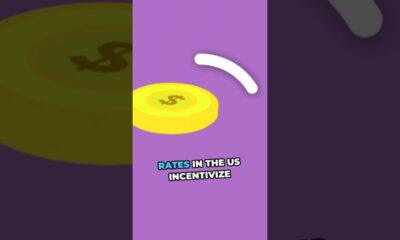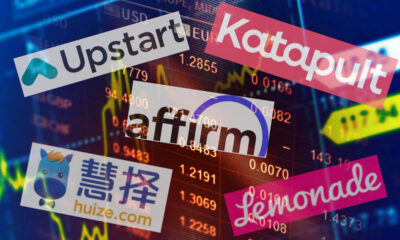Fintech
How easy loans can lead to fraud

Like most people, Quentella Livers, a 75-year-old widow from New Orleans, sometimes receives scam solicitations in the mail. So, when in May 2023 she received a statement from a financial technology company called Dividend Finance, informing her that a lien had been taken on property she owned, she threw the document away, thinking that it was rubbish.
But the notifications kept coming. The Livers continued to discard them, until he received a letter from a man named Jason, another New Orleans homeowner. Jason had received similar correspondence and checked property records to find that another finance company called GoodLeap had taken a lien on his house, as well as one on Livers’. It wasn’t just them. Someone from a contractor called Deep South Renovations allegedly took hundreds of thousands of dollars in loans from Dividend and GoodLeap on at least eight homes in the New Orleans area by impersonating the homeowners and using their property as collateral, according to Jason, who is in contact with homeowners.
This person, listed on two contracts as Samantha McGee, had taken advantage of the fact that GoodLeap and Dividend pay loans directly to contractors performing home improvement projects rather than to homeowners. McGee had used real people and home addresses but fake Social Security numbers and email addresses to secure the loans, Livers and Jason say. The perpetrator appears to have relied on GoodLeap and Dividend not performing a search of the homes to ensure that the Social Security numbers and identities on the loan application matched those on file, Jason says. Livers called both companies to try to get the bond released, a process she said proved difficult. “When I talked to them, I said, ‘I don’t understand your company,’” Livers says. “Do you give loans to people without contacting them?”
Livers and Jason were contacted by the FBI regarding the case. (Jason is a pseudonym; he didn’t want his full name used in this article to protect against identity fraud, but he shared documentation he received from GoodLeap with TIME.) The FBI declined to comment on the matter, but several homeowners who were the victims told TIME they were contacted by the FBI. Deep South Renovations could not be reached for comment.
Dividend says it investigated Livers’ concerns and took immediate action to terminate the loan and release the lien. “Unfortunately, fraud is a pervasive problem across all financial services categories in today’s digital age,” a company spokesperson said in a statement to TIME. GoodLeap says the case was a “complex fraud scheme by sophisticated criminals” and that he reported the fraud to the FBI and cooperated with the bureau in the investigation. “GoodLeap has seen less than 0.05% fraudulent transactions on our platform,” says Jesse Comart, a company spokesperson. “Protecting consumers from bad actors is our top priority.”
To know more: The rooftop solar industry may be on the verge of collapse.
GoodLeap and Dividend are two of the few financial technology (or fintech) companies making it easier for consumers to borrow money for home improvement projects, including installing solar panels. These companies, which include Solar Mosaic and Sunlight Financial (which filed for Chapter 11 bankruptcy in October 2023), make it relatively easy to get a loan, often using iPhones and tablets to facilitate same-day sales.
But some consumer advocates say there’s a downside to this quick lending process: The check skips important steps. “You have to make sure the person is who they say they are,” says Carla Sanchez-Adams, a senior attorney at the National Consumer Law Center who studies banking and payment systems. “A lot of fintechs are not good at this.”
It appears that Livers and Jason were victims of what is called synthetic identity fraud. Many companies would have detected the scheme with a simple credit check, says Frank McKenna, co-founder and chief anti-fraud strategist at Point Predictive, an anti-fraud AI company. According to McKenna, a credit report should find that the Social Security number listed on the application does not match the person’s actual Social Security number. “There should have been a big red flag,” he says.
Dividend states that in-person and multi-factor authorization is required to make loans. The company also says that an inaccurately matched Social Security number to a name would raise a red flag and add a full stop that must be cleared before the loan is underwritten. This appears not to have happened in Livers’ case. GoodLeap says it has “several layers of fraud protection” and has added new ones to “keep pace with evolving criminal activity.” He says he reported the fraud to the FBI’s Financial Crimes Division.
Jason filed a complaint with the Consumer Financial Protection Bureau and then received a letter from GoodLeap thanking him for bringing the situation to the company’s attention. He was not responsible for any debt, the letter said.
Jason also emailed other property owners in New Orleans who had a lien on their home from Goodleap but who did not have permission for solar panels. For some of them, including the Livers, the letter was how they discovered that someone had withdrawn money in their name. David Bryan was another of the homeowners who had been given a lien on his property by Goodleap, who sent him a letter saying he owed $45,000. He is still baffled that GoodLeap granted the loan. “Every loan I ever got, I went to the bank to have to sign for,” Bryan says.
Traditionally, banks have provided the majority of consumer loans. But after the Great Recession, banks tightened lending standards and new companies emerged to fill the gap. By 2023, 14% of personal loans will be issued by fintechs Federal Reserve Bank of New York.
To know more: Banks are not doing enough to protect customers from scams.
While banks are subject to extensive monitoring by federal agencies, fintech companies are not subject to much federal oversight or regulation. All they have to do is apply for and maintain a license to lend in a particular state, says Chris Odinet, a law professor at the University of Iowa. There aren’t many criteria to get a lending license, Odinet says. “There are so many non-bank and fintech companies of various sizes that it is difficult to have an inventory of companies so you can monitor them to see if they are involved in illegal practices,” says Odinet. “They don’t get caught until they’ve done a lot of damage.”
Legal experts and consumer advocates say a wide variety of fintech companies are skipping some important steps in the evaluation process. The whistleblowers told federal financial regulators that Cash App, a mobile payment platform, does not have “an effective process for establishing the identity of its customers.” according to NBC News.
Solar lenders have come under particular scrutiny for the way they approve applications. In March, Minnesota Attorney General Keith Ellison filed a complaint against Goodleap, Sunlight Financial, Solar Mosaic and Dividend Solar Finance, alleging that the companies engaged in deceptive lending practices. The lawsuit focuses on companies that “specialize in consumer credit through a software application on a smartphone or tablet” and argue that they win customers by promising quick, easy approval and requiring minimal documentation. The complaint alleges that sellers promise low interest rates and monthly payments while hiding a large upfront fee that is “secretly added” to the price of a system.
Neither Solar Mosaic nor Sunlight Financial responded to requests for comment on the Minnesota lawsuit, which is proceeding in court. In a statement provided to TIME, Fifth Third, Dividend’s owner, said it believes the lawsuit’s allegations are “wrong” and that the company intends to “vigorously defend itself.” GoodLeap says its disclosures follow all federal and state laws, including the Truth in Lending Act.
Some consumers who knowingly took out loans from these companies say they were charged unexpected fees or faced undisclosed terms in which their loans ballooned. Others claim that the solar panels they received did not produce the promised amount of electricity. Still other consumers complain that solar lenders lent them money for panels that never worked.
One solar company, Pink Energy, signed up thousands of customers in 15 states, then filed for bankruptcy in late 2022. Seventeen attorneys general are investigating Pink Energy and the lenders it partnered with, including Dividend, according to the annual report of the Fifth Third, the bank that owns Dividend. The bank “is currently cooperating with investigations related to several civil investigative requests by a number of state attorneys general regarding the residential solar installation industry and the lending practices of credit providers to this market, which includes Dividend Solar Finance, LLC,” according to the annual report.
GoodLeap, Solar Mosaic, and Sunlight Financial are all private companies, so it’s difficult to know how many loans they’re making or the total value of those loans. But Fifth Third made $3.8 billion worth of loans for solar energy installations in the first three months of 2024, a 75% increase from a year earlier, according to its earnings reports.
The Consumer Financial Protection Bureau declined to comment for this story, but referred TIME to the report consumer complaints database. Of more than 5 million complaints, 162 named GoodLeap, 185 named Solar Mosaic, 74 named Sunlight Financial, and 3,717 named Fifth Third, the parent company of Dividend Solar Finance.
Fintech
Lloyds and Nationwide invest in Scottish fintech AI Aveni

Lloyds Banking Group and Nationwide have joined an £11m Series A funding round in Scottish artificial intelligence fintech Aveni.
The investment is led by Puma Private Equity with additional participation from Par Equity.
Aveni creates AI products specifically designed to streamline workflows in the financial services industry by analyzing documents and meetings across a range of operational functions, with a focus on financial advisory services and consumer compliance.
The cash injection will help fund the development of a new product, FinLLM, a large-scale language model created specifically for the financial sector in partnership with Lloyds and Nationwide.
Joseph Twigg, CEO of Aveni, explains: “The financial services industry doesn’t need AI models that can quote Shakespeare, it needs AI models that offer transparency, trust and, most importantly, fairness. The way to achieve this is to develop small, highly tuned language models, trained on financial services data, vetted by financial services experts for specific financial services use cases.
“FinLLM’s goal is to set a new standard for the controlled, responsible and ethical adoption of generative AI, outperforming all other generic models in our selected financial services use cases.”
Robin Scher, head of fintech investment at Lloyds Banking Group, says the development programme offers a “massive opportunity” for the financial services industry by streamlining operations and improving customer experience.
“We look forward to supporting Aveni’s growth as we invest in their vision of developing FinLLM together with partners. Our collaboration aims to establish Aveni as a forerunner in AI adoption in the industry, while maintaining a focus on responsible use and customer centricity,” he said.
Fintech
Fairexpay: Risk consultancy White Matter Advisory acquires 90% stake in fintech Fairexpay

Treasury Risk Consulting Firm White Matter Alert On Monday he announced the acquisition of a 90% stake in the fintech startup Fair payment for an undisclosed amount. The acquisition will help White Matter Advisory expand its portfolio in the area of cross-border remittance and fundraising services, a statement said. White Matter Advisory, which operates under the name SaveDesk (White Matter Advisory India Pvt Ltd), is engaged in the treasury risk advisory business. It oversees funds under management (FUM) totaling $8 billion, offering advisory services to a wide range of clients.
Improve your technology skills with high-value skills courses
| IIT Delhi | Data Science and Machine Learning Certificate Program | Visit |
| Indian School of Economics | ISB Product Management | Visit |
| MIT xPRO | MIT Technology Leadership and Innovation | Visit |
White Matter Advisory, based in Bangalore, helps companies navigate the complexities of treasury and risk management.
Fairexpay, authorised by the Reserve Bank of India (RBI) under Cohort 2 of the Liberalised Remittance Scheme (LRS) Regulatory Sandbox, boasts features such as best-in-class exchange rates, 24-hour processing times and full security compliance.
“With this acquisition, White Matter Advisory will leverage Fairexpay’s advanced technology platform and regulatory approvals to enhance its services to its clients,” the release reads.
The integration of Fairexpay’s capabilities should provide White Matter Advisory with a competitive advantage in the cross-border remittance and fundraising market, he added.
The release also states that by integrating Fairexpay’s advanced technology, White Matter Advisory aims to offer seamless and convenient cross-border payment solutions, providing customers with secure options for international money transfers.
Fintech
Rakuten Delays FinTech Business Reorganization to 2025

Rakuten (Japan:4755) has released an update.
Rakuten Group, Inc. and Rakuten Bank, Ltd. announced a delay in the reorganization of Rakuten’s FinTech Business, moving the target date from October 2024 to January 2025. The delay is to allow for a more comprehensive review, taking into account regulatory, shareholder interests and the group’s optimal structure for growth. There are no anticipated changes to Rakuten Bank’s reorganization objectives, structure or listing status outside of the revised timeline.
For more insights on JP:4755 stock, check out TipRanks Stock Analysis Page.
Fintech
White Matter Advisory Acquires 90% Stake in Fintech Startup Fairexpay

You are reading Entrepreneur India, an international franchise of Entrepreneur Media.
White Matter Advisory, which operates under the name SaveDesk in India, has announced that it is acquiring a 90% stake in fintech startup Fairexpay for an undisclosed amount.
This strategic move aims to strengthen White Matter Advisory’s portfolio in cross-border remittance and fundraising services.
By integrating Fairexpay’s advanced technology, White Matter Advisory aims to offer seamless and convenient cross-border payment solutions, providing customers with secure options for international money transfers.
White Matter Advisory, known for its treasury risk advisory services, manages funds under management (FUM) totaling USD 8 billion.
Founded by Bhaskar Saravana, Saurabh Jain, Kranthi Reddy and Piuesh Daga, White Matter Advisory helps companies effectively manage the complexities of treasury and risk management.
The SaveDesk platform offering includes a SaaS-based FX market data platform with real-time feeds for over 100 currencies, bank cost optimization services, customized treasury risk management solutions, and compliance guidance for the Foreign Exchange Management Act (FEMA) and other trade regulations.
Fairexpay is a global aggregation platform offering competitive currency exchange rates from numerous exchange partners worldwide. Catering to both private and corporate customers, Fairexpay provides seamless money transfer solutions for education, travel and immigration, as well as simplifying cross-border payments via API and white-label solutions for businesses. Key features include competitive currency exchange rates, 24-hour processing times, extensive currency coverage of over 30 currencies in more than 200 countries, and secure, RBI-compliant transactions.
-

 DeFi1 year ago
DeFi1 year agoSwitchboard Revolutionizes DeFi with New Oracle Aggregator
-

 News1 year ago
News1 year agoLatest Business News Live Updates Today, July 11, 2024
-

 DeFi1 year ago
DeFi1 year agoIs Zypto Wallet a Reliable Choice for DeFi Users?
-

 DeFi1 year ago
DeFi1 year ago👀 Lido prepares its response to the recovery boom
-

 Fintech1 year ago
Fintech1 year agoFinTech LIVE New York: Mastercard and the Power of Partnership
-

 DeFi1 year ago
DeFi1 year agoEthena downplays danger of letting traders use USDe to back risky bets – DL News
-

 Fintech1 year ago
Fintech1 year ago121 Top Fintech Companies & Startups To Know In 2024
-

 ETFs1 year ago
ETFs1 year agoGold ETFs see first outing after March 2023 at ₹396 cr on profit booking
-

 DeFi1 year ago
DeFi1 year agoTON Network Surpasses $200M TVL, Boosted by Open League and DeFi Growth ⋆ ZyCrypto
-

 Fintech1 year ago
Fintech1 year agoFintech unicorn Zeta launches credit as a UPI-linked service for banks
-

 ETFs1 year ago
ETFs1 year agoLargest US Bank Invests in Spot BTC ETFs While Dimon Remains a Bitcoin Hater ⋆ ZyCrypto
-

 News1 year ago
News1 year agoSalesforce Q1 2025 Earnings Report (CRM)

















